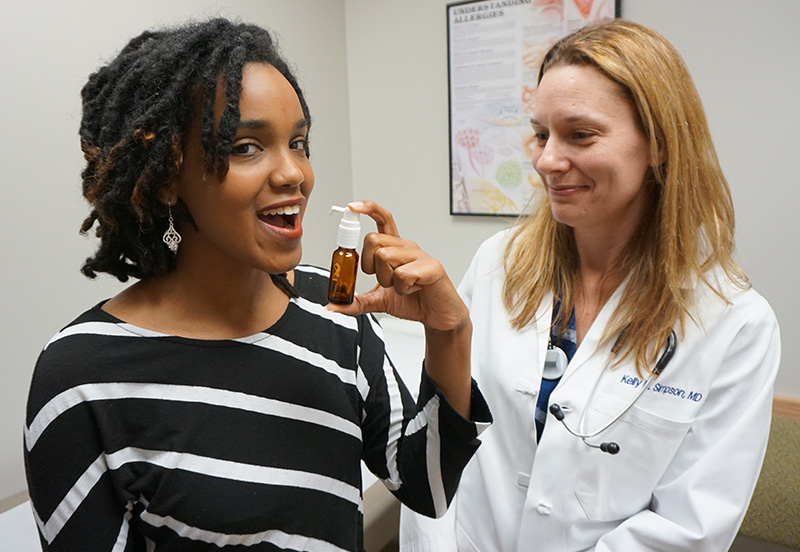- Empty cart.
- Continue Shopping
The Importance of Knowing Medication Allergies

In the realm of healthcare, knowledge is paramount. From the smallest details to the most significant aspects of a patient’s medical history, every piece of information plays a crucial role in providing effective and safe treatment. One such piece of information that can have life-altering consequences is a patient’s medication allergies. Understanding the significance of knowing medication allergies is a fundamental aspect of modern healthcare.
The Basics of Medication Allergies
Before delving into the significance of medication allergies, it’s essential to understand what they are. Medication allergies occur when the body’s immune system reacts adversely to specific medications, treating them as harmful invaders rather than therapeutic agents. This immune response can manifest in a range of symptoms, from mild skin rashes to severe, life-threatening anaphylaxis.
The Potentially Life-Threatening Consequences
Anaphylactic Shock: A Critical Concern
One of the most severe consequences of medication allergies is anaphylactic shock. Anaphylaxis is a rapid and extreme allergic reaction that can affect multiple systems within the body simultaneously. Symptoms can include difficulty breathing, swelling of the face and throat, a sudden drop in blood pressure, and loss of consciousness. Without prompt medical intervention, anaphylaxis can be fatal within minutes.
Imagine a scenario where a healthcare provider administers a medication without knowledge of a patient’s allergy. In the absence of proper documentation, this life-threatening situation could easily unfold. Therefore, understanding and documenting medication allergies are of paramount importance to prevent such dire consequences.
Adverse Reactions: More Than Just Rashes
While not all medication allergies lead to anaphylaxis, they can still result in a range of adverse reactions. These can include skin rashes, hives, gastrointestinal distress, and even organ damage in severe cases. For instance, a patient with a penicillin allergy may develop a severe skin rash or, in more extreme cases, experience kidney damage due to an adverse reaction.
These complications not only harm the patient’s health but can also lead to extended hospital stays, increased medical costs, and a lower quality of life. Recognizing and documenting medication allergies can help prevent such situations, ensuring that the right medications are prescribed and administered.
The Role of Healthcare Providers
Comprehensive Patient Assessment
To ensure patient safety, healthcare providers must conduct a comprehensive assessment of each patient’s medical history. This assessment should include a detailed inquiry about medication allergies. By actively engaging patients in discussions about allergies, healthcare providers can identify potential risks and make informed decisions about treatment options.
Medication Reconciliation
Medication reconciliation is a crucial step in healthcare, particularly during transitions of care, such as hospital admissions, discharges, or transfers between healthcare facilities. During this process, healthcare providers compare a patient’s current medication regimen with their medical history and allergies.
When medication allergies are accurately documented and communicated during reconciliation, the risk of adverse drug events is significantly reduced. This is especially important when patients are under the care of multiple providers or are taking multiple medications, as the potential for drug interactions increases.
The Importance of Patient Engagement
Active Participation in Healthcare
Patients play a vital role in ensuring their own safety. They should actively engage in their healthcare by providing accurate and up-to-date information about their medication allergies. This information should be shared not only with their primary care physician but also with all healthcare providers involved in their treatment.
Personal Responsibility
Patients should also take personal responsibility for understanding their allergies. They should be aware of the names of the medications they are allergic to, as well as the specific allergic reactions they have experienced. This knowledge empowers patients to advocate for themselves and ask questions about their treatment.
The Role of Technology in Medication Allergy Management
Electronic Health Records (EHRs)
Electronic health records (EHRs) have revolutionized healthcare by providing a centralized repository of patient information that can be accessed by authorized healthcare providers. EHRs are invaluable for documenting and sharing medication allergies across different healthcare settings.
Through EHRs, healthcare providers can quickly access a patient’s allergy information, reducing the risk of prescribing or administering an allergenic medication inadvertently. The use of EHRs enhances communication and collaboration among healthcare teams, further ensuring patient safety.
Medication Allergy Alert Systems
Many healthcare institutions employ medication allergy alert systems within their EHRs. These systems automatically flag potential medication allergies when a healthcare provider attempts to prescribe a medication. This real-time alert system serves as an additional layer of protection, prompting providers to double-check the patient’s allergy status before proceeding with treatment.
Legal and Ethical Implications
Informed Consent
Informed consent is a foundational principle of medical ethics. Patients have the right to be informed about the risks and benefits of any proposed treatment, including medication. When medication allergies are not accurately documented and disclosed, obtaining informed consent becomes challenging. Patients cannot provide informed consent if they are not aware of the potential risks associated with a medication.
Liability
From a legal standpoint, healthcare providers may face liability if they fail to inquire about or document a patient’s medication allergies. In cases of adverse reactions or harm due to medication, the absence of proper documentation can place the responsibility squarely on the shoulders of the healthcare provider.
Finally, The importance of knowing medication allergies cannot be overstated in the realm of healthcare. Anaphylactic shock, adverse reactions, extended hospital stays, and increased medical costs are just a few of the potential consequences of not recognizing and documenting these allergies. Healthcare providers must conduct comprehensive assessments, engage patients, and utilize technology to manage medication allergies effectively.
Patients, too, have a crucial role to play in their own safety. By actively participating in their healthcare and taking personal responsibility for understanding their allergies, patients can contribute to a safer and more effective healthcare experience.
In the end, accurate documentation and communication of medication allergies are not just best practices; they are ethical imperatives with legal ramifications. Every healthcare provider and patient must recognize their role in this critical aspect of healthcare, as the consequences of neglecting medication allergies can be life-altering. Ultimately, knowledge truly is power when it comes to medication allergies, and it is a power that can save lives.








